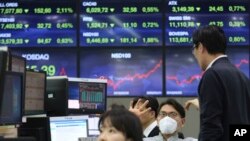Stock markets around the world tumbled Monday over fears that China’s coronavirus outbreak is causing long-term damage to the supply chains that are the lifeblood of the global economy.
In the United States, the major stock market indices at one point were down three percentage points on Monday, as investors rushed to safe havens, including gold and U.S. Treasury bonds. The movement in the U.S. mirrored that across Europe and Asia, whose earlier trading days had already signaled the beginning of what appears to be a global sell-off.
The World Health Organization, which monitors global disease outbreaks, has so far declined to label the coronavirus a “pandemic” — its most dire classification. The WHO has said that it now believes the spread of the virus in China has already passed its peak and is on the decline.
In a news conference Monday, WHO chief of health emergencies, Michael Ryan, said, “There is still a possibility that we can contain the virus and interrupt its transmission. But the virus may settle down into an endemic pattern of transmission, into a seasonal pattern or could accelerate into a full-blown global pandemic. At this point, it is not possible to say which of those realities is going to happen.”
Global coronavirus cases
Globally, there are reports of more than 79,000 cases in 29 countries, and more than 2,600 deaths. The overwhelming majority of the cases have been contained to China.
But some of the largest concentrations of the disease outside China are in major centers of economic power in the Asia-Pacific region. South Korea, a key manufacturing hub, has reported more than 800 cases. Japan, one of the world’s largest economies, is likewise dealing with hundreds of cases, though most are among passengers on a quarantined cruise ship. And now Europe is confronting its first major outbreak, in Italy.
Across the globe, economists are struggling to predict the impact of the spreading virus, hampered by a lack of key information and, in some cases, by concerns that the information that is available cannot be trusted.
“We can model anything — we have models of the global economy, country by country, sector by sector,” said Dr. Christine McDaniel, an economist and senior research fellow at the Mercatus Center, a libertarian-leaning think tank outside Washington, D.C. “It just depends on what the shock is. So the real question is, what is the shock? ... But, we just don't know how long it will go on or how deep the impact will be.”
The flow of information from China, where the outbreak began in December, has been incomplete and confusing, adding to the uncertainty in global financial markets. Late on Sunday, for example, an announcement went out that quarantine measures in Wuhan, the city at the epicenter of the outbreak, were going to be eased. Hours later, a second announcement contradicting the first was issued.
Other news from China, including reports that the number of new cases identified is slowing down, were offset by reports of its appearance in other far-flung parts of the world.
Italy, for example, has placed travel restrictions on more than 50,000 people in the region surrounding Milan, its economic and industrial heartland. The government, which announced only three detected cases of the virus late last week, said Monday that it now knows of more than 200, as well as five reported deaths.
Extensive losses
McDaniel, who has previously served as a deputy assistant secretary at the Treasury Department and senior trade economist in the White House Council of Economic Advisers, said to gauge how extensive the losses could be, one can look at the already extensive damage the virus is having on the travel and tourism industries which account for 10% of the global economy. She said that means the damage caused by the virus will likely far outstrip that caused by the ongoing tariff-based trade war between the U.S. and China.
“When you start putting it in perspective, it really dwarfs the damage the tariffs have done,” she said.
Her assessment echoes concerns raised by IMF Managing Director Kristalina Georgieva in a statement delivered to the G-20 meeting of finance ministers and central bank governors over the weekend.
Original assessments, she said, had China’s economy rebounding in the second quarter of the year, with an overall Gross Domestic Product drop of 0.4% for the year inside China and a 0.1% drop globally.
“But we are also looking at more dire scenarios where the spread of the virus continues for longer and more globally, and the growth consequences are more protracted,” Georgieva said. “Global cooperation is essential to the containment of the COVID-19 and its economic impact, particularly if the outbreak turns out to be more persistent and widespread.”
A complicating and perhaps exacerbating factor in considering the potential global impact of the virus is that much of the global supply of what is needed to combat it — including medicines and medical supplies — is manufactured in China. Public health officials have begun warning governments around the world that further closing off China from the global economy could actually make the disease more difficult to fight by causing shortages.











